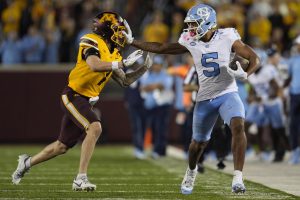
Emerson College bans protests in Boylston Place Alley after arrests: ‘Civil disobedience is contrary to Emerson College policy’
Emerson College has added many protest restrictions as students return to campus for the fall after a chaotic spring that peaked with more than 100 arrests during a pro-Palestine rally.
These new restrictions include a ban on protesting in Boylston Place Alley, which is the public way where students in the spring set up an encampment before Boston Police broke it up and arrested 118 pro-Palestinian protesters.
Ahead of the school year, officials wrote to students about these “policy changes.”
“The College does not own the entirety of the Alley,” reads the college’s website titled, “Expression at Emerson.”
“There are many other right holders over this corridor,” the college added. “City and state authorities can respond to protests and demonstrations in the Alley without requiring agreement from the College. As a result, it is an inappropriate place for the College to permit protests, rallies, or large events. To ensure this rule is applied equally, the Alley won’t be used for any Emerson-related events.”
The student protesters in the spring had been given a deadline before Boston Police would break up the encampment in the alley that leads to the state Transportation Building.
Then in the middle of the night, the cops moved in and arrested 118 protesters.
“Civil disobedience is the willful, unlawful, and peaceful violation of a law, regulation or policy perceived to be unjust,” the college wrote on its website about the policy changes. “Civil disobedience is contrary to Emerson College policy and is not protected by the First Amendment.”
“As a private institution, Emerson has the right to time, place, and manner restrictions on speech,” the college wrote. “It is consistent with our community values to protect the freedom of all our people to live, work, and study in line with our core mission. We strive to do that in a content-neutral way that applies equally to all members of our community.”
Emerson will be providing indoor spaces where pre-registered demonstrations can occur if protesters follow certain guidelines.
The college said protests cannot be held before 8 a.m. or after 7 p.m., outside of posted building hours, or when the campus is closed for a break or holiday.
Tents and other permanent or temporary structures may not be used in any type of protest.
Emerson’s Jews Against Zionism posted that the recent series of moves at the college are “made to clamp down on the student body and to decrease student activism and free speech.”
The group wrote, “Students have been voicing their fear and distrust for both the Emerson and Boston police departments, only to be met with more security and restrictions from the school.”


